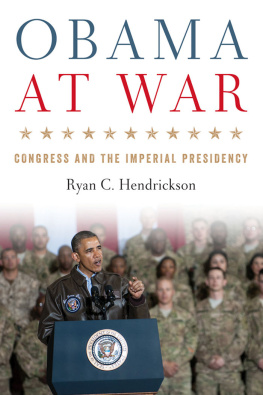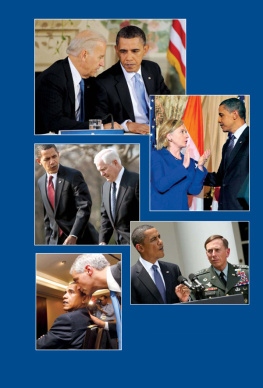Thank you for downloading this Threshold Editions eBook.
Join our mailing list and get updates on new releases, deals, bonus content and other great books from Threshold Editions and Simon & Schuster.
C LICK H ERE T O S IGN U P
or visit us online to sign up at
eBookNews.SimonandSchuster.com
We hope you enjoyed reading this Threshold Editions eBook.
Join our mailing list and get updates on new releases, deals, bonus content and other great books from Threshold Editions and Simon & Schuster.
C LICK H ERE T O S IGN U P
or visit us online to sign up at
eBookNews.SimonandSchuster.com

Threshold Editions
A Division of Simon & Schuster, Inc.
1230 Avenue of the Americas
New York, NY 10020
www.SimonandSchuster.com
Copyright 2015 by Mark Moyar
All rights reserved, including the right to reproduce this book or portions thereof in any form whatsoever. For information, address Threshold Editions Subsidiary Rights Department, 1230 Avenue of the Americas, New York, NY 10020.
First Threshold Editions hardcover edition June 2015
THRESHOLD EDITIONS and colophon are trademarks of Simon & Schuster, Inc.
For information about special discounts for bulk purchases, please contact Simon & Schuster Special Sales at 1-866-506-1949 or business@simonandschuster.com.
The Simon & Schuster Speakers Bureau can bring authors to your live event. For more information or to book an event, contact the Simon & Schuster Speakers Bureau at 1-866-248-3049 or visit our website at www.simonspeakers.com.
Jacket design by Daniel Rembert
Jacket photograph of Predator B AP photo/Eric Gay
Author photograph courtesy of the author
Library of Congress Cataloging-in-Publication Data
Moyar, Mark, 1971
Strategic failure : how President Obamas military amateurism has imperiled America / Mark Moyar.
pages cm
Includes bibliographical references and index.
1. Obama, BarackMilitary leadership.2.United StatesMilitary policyEvaluation.3.United StatesMilitary policyHistory21st century.4.National securityUnited States.5.United StatesDefenses.6.Downsizing of organizationsUnited StatesHistory21st century.7.United StatesArmed ForcesAppropriations and expenditures.8.World politics21st century.9.Strategy. I. Title.
E908.3.M692015
355'.033573dc23
2014044053
ISBN 978-1-4767-1324-3
ISBN 978-1-4767-1327-4 (ebook)
To the men and women working on behalf of the U.S. government around the world
CONTENTS
PREFACE
When work began on this book, in the middle of 2012, pundits of all stripes were declaring Barack Obama to be unusually strong on national security. Admirers, of whom Obama still had a great many, hailed the President for obliterating the long-standing perception that Democrats were second best to Republicans when it came to national defense. Given the stagnation of the economy and the unpopularity of Obamas signature health care legislation, the conventional wisdom held that Obamas foreign policy record constituted the greatest single asset of his reelection campaign.
Daniel Klaidman of Newsweek, for instance, could be heard opining that two generations had elapsed since a Democratic president has been as strong on national security as Barack Obama.
Aside from the Republican base, most Americans held Obamas national security record in similarly high regard during 2012. Obamas public approval rating on national security hovered near 50 percent throughout the year, with the disapproval rating roughly 10 percentage points lower. Although national security was not the decisive factor in Obamas electoral victory of November 2012that distinction went to the tearing down of challenger Mitt Romney by Obama and othersthese perceptions certainly helped him on election day.
It was my conviction in 2012, as it is now, that the widespread acclaim of Obamas foreign policy was undeserved. During his first term, Obama had been ineffective in promoting U.S. interests abroad, and his actions were increasing the risks to the American people. Consequently, one of this books initial objectives was to persuade Americans that the glossy veneer on Obamas national security record masked corrosion blisters that were in danger of rusting through.
During the more than two years required to write the book, opinion on Obama and his national security policies experienced a remarkable reversal, comparable in magnitude to the change in opinion on Jimmy Carter during 1979 and 1980. The leading cause was the rusting through of international problems that Obama had created or exacerbated. Most spectacular among the catastrophes were the killing of the U.S. ambassador at Benghazi, the territorial conquests of the Islamic State of Iraq and Syria (ISIS), and the Russian invasion of Ukraine. Democratic congressmen, centrist pundits, and even some of Obamas former cabinet officials started bemoaning the Presidents weakness in the international arena. The Presidents approval numbers on national security fell below his disapproval numbers in the middle of 2013, and by the fall, the approval figure had plunged below 35 percent, while the percentage of Americans disapproving approached 55. Among American military personnel, Obamas approval rating fell from its peak of 35 percent to just 15 percent in late 2014, while his disapproval rating reached 55 percent.
Thus did world events conspire to steal some of the books originally scheduled thunder. Disabusing Americans of an undue admiration for President Obamas policies, however, was never the sole objective of this book. Indeed, my concern was less with any one individual than with policies that were leading the nation and the world toward disaster. Most of what follows should still be of intense interest to Americans, for several reasons.
For one, the innumerable news stories and cable TV debates on the biggest overseas catastrophes have disseminated only snippets of each catastrophic event to the American public. This book fills in the missing sections, and corrects segments of the media-driven narrative that are inaccurate or misleading. It also explains which elements of the story are truly important, and which are unworthy of endless repetition by televisions talking heads. The analysis reveals that the flaws in current policies are broader and deeper than most Americans know, and that they reflect misguided assumptions that are not peculiar to Obama but are shared by the leading pretenders to the next Democratic presidential nominationObamas vice president, Joe Biden, and his first secretary of state, Hillary Clinton.
For another, the risks that Obamas policies have created go well beyond the few countries that have figured prominently in the news. Every continent in the world has been affected. This book takes the reader from the remote peaks of North Waziristan and the fishing cities of Somalia to the contested waters of the Scarborough Shoal and the drug-smuggling routes of Central America.
Third of all, this book shows that the deterioration of Americas strategic position did not commence in Obamas second term, as public opinion polls and political punditry would suggest, but instead began as soon as Obama took office in January 2009. The strategic decline accelerated in 2011, as White House insiders increasingly took charge of national security policy and the defense budget sustained its first big cuts. Some of the poor choices and resultant setbacks were concealed in the first term because of luck, which among other things thwarted several attacks on the U.S. homeland, or because of the time lag between the making of a decision in Washington, D.C., and the playing out of events in the affected countries. Other deficiencies were hidden from view by the inattention of the mainstream media, which had a tendency to avert its eyes from Obamas early failings. The nations tardiness in perceiving Obamas shortcomings should serve as a cautionary note for all those who would withhold criticism or unflattering information on account of a politicians ideology or identity. Obamas poor performance in his first term should advise voters against paying more heed to a politicians campaign rhetoric than his voting record, and against expecting that someone with no national security experience and no executive experience can handle the demands of the U.S. presidency.
Next page









